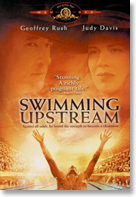Movies |
Swimming Upstream
directed by Russell Mulcahy
By
Published: May 26, 2011
Category:
Drama
Geoffrey Rush won Academy Award and Golden Globe nominations for "The King’s Speech."
He’s featured in yet another of the "Pirates of the Caribbean" series.
Last winter he starred in a play in New York. Add another line to his résumé.
That record of achievement turns out to even larger — Geoffrey Rush is one of about two dozen actors who’s won an Academy Award, a Tony Award and an Emmy. And if we add in the lesser honors, we see two Gold Globes and three honors from the Screen Actors Guild.
For kids, he’s all about pirates. For adults who don’t follow movie careers the way young boys chart batting averages, "The King’s Speech" is the film that — finally — made Rush unforgettable. And rightfully so. He’s the rock on which the movie is built. When Colin Firth can’t speak, his coach is all-important; it’s only when the King masters his lessons and gets the glory that his coach retreats. Rush’s performance is, say I, the more subtle and extraordinary. [To buy the CD of "King’s Speech from Amazon, click here. To buy or rent the download, click here.]
But for me, the best of Rush’s work was made in — what a surprise — his native Australia. Which figures. These are characters he can imagine walking down streets that he knows well. These are men he might have become. (Yes, I know that Lionel Logue, the King’s speech therapist, was Austrialian. I’m talking about playing an Australian in Australia.)
The first Aussie film I’d commend is "Lantana." It’s a thriller about a missing woman — Rush’s wife. She had no reason to disappear. Someone dunnit. And why not the husband? [To buy the CD of "Lantana" from Amaszon, click here.]
But for me, Rush’s most fascinating performance is as the angry, overbearing, alcoholic father in "Swimming Upstream" — and I don’t say this because Tony Fingleton, who wrote the screenplay about his childhood, is an old friend. [To buy the CD of "Swimming Upstream" from Amazon, click here. To watch the movie right now, click here.]
In addition to Rush, the film stars Judy Davis (as Dora Fingleton, Tony’s mother) and a teenage hunk as young Tony. On the surface, the movie follows Tony as he literally swims his way to a full scholarship at Harvard. Yes, a scholarship, because Harold Fingleton was a dockworker, often unemployed, and at no time interested in the future of the second of his five children. His first thought was for Harold, Jr., and when Harold Jr. faltered as an athlete, he turned his attention to John, his third son. What about Tony, the second son? He played piano. He was his mother’s boy. He was weak, soft, "a poofter."
But in the pool, Tony had learned that "water kept you alive." In the pool, he felt safe. And so, with no one watching, he mastered the backstroke. Harold learns about Tony’s prowess by accident. He starts training him because he’s decided to train John — and Tony, desperate for his father’s approval, responds.
You can’t live in water. And home is hell. Harold is volatile; you can’t predict his moods. And Dora can’t charm him out of every rage. Darkness is a never-ending cloud, a leaden heaviness, in this household — and you feel its weight on your heart. In part, that’s testimony to the spare, unvarnished screenplay. But even more, it’s in the interplay between Geoffrey Rush and Judy Davis. Their careers are a litany of great performances; "Swimming Upstream" goes to the top of their list of lifetime achievements.
And that is why "Swimming Upstream" isn’t really a "sports movie." It’s way too complex. In "Rocky," we root for Stallone because he’s a good-hearted lug who’s got one shot in life; there are no second acts for him. But Tony Fingleton became a great swimmer to get back at his father, to beat his father, to have one thing in his life that was his own — and in winning the Australian championship and that thick envelope from Harvard, he swam away from his oppressor forever.
The years pass. Vision gives shape to memory. And memory, tempered by compassion, is the raw material of art. "Swimming Upstream" is art, in large part because of the many sides of Harold Fingleton. You curse him. You wish him dead. And then you think: Without him, none of this would have happened. And you think: My God, that was some great acting.


